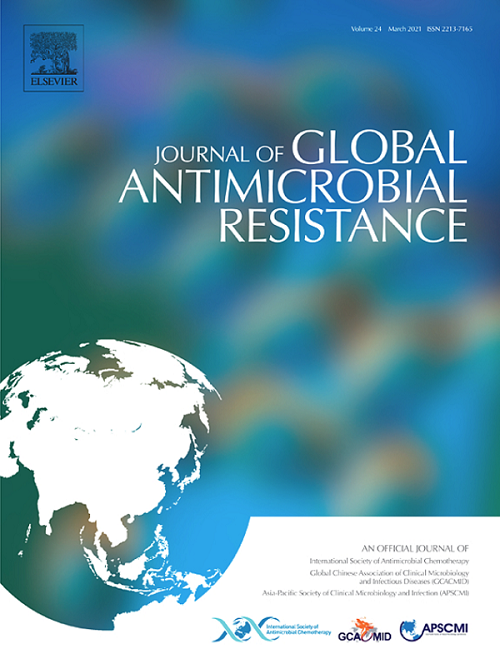Need for antifungal stewardship in critically ill cancer patients: A pilot study from a tertiary hospital in Eastern India
IF 3.2
3区 医学
Q2 INFECTIOUS DISEASES
引用次数: 0
Abstract
Objective
The increasing incidence of invasive fungal infections (IFIs) in critically ill and immunocompromised populations, particularly in India, challenges antifungal management. Rising resistance and high ICU burden of invasive candidiasis and mould infections underscore the need for antifungal stewardship (AFS). This study evaluated AFS needs in the ICU of a tertiary oncology centre in Eastern India by assessing antifungal prescription appropriateness.
Methods
A prospective pilot study was conducted from 12–31 August 2024, in the ICU/high dependency unit of an oncology/haematology hospital in Eastern India. All patients receiving systemic antifungals (SAF) were included. Appropriateness of SAF prescriptions, diagnostic workup and regimen modifications were assessed based on predefined criteria validated by external experts. Data were collected at SAF initiation and on day 5 or at discharge, whichever occurred first.
Results
Among 25 patients (median age 56 years, interquartile range 49–64; 68% female; 80% solid cancers), SAF was empiric in 76%, targeted in 16% and prophylactic in 8%. Prescription appropriateness was optimal in 55%, suboptimal in 15% and inappropriate in 30%. Loading doses were administered in 85%. Diagnostic workup was insufficient in 75% of suspected invasive pulmonary aspergillosis (IPA) and 83% of invasive candidiasis (IC) cases. No SAF was discontinued within 5 d, and only 10% of patients had regimen modifications.
Conclusion
Empiric antifungal prescriptions were frequently inappropriate, with insufficient diagnostic investigations, particularly for IC. The lack of de-escalation highlights the urgent need for an ICU-specific AFS programme to optimize antifungal use and improve diagnostics in high-risk patients.
需要抗真菌管理的危重癌症患者:一个试点研究从三级医院在印度东部。
背景:。在危重病人和免疫功能低下人群中,侵袭性真菌感染(IFIs)的发病率不断上升,特别是在印度,这给抗真菌管理带来了挑战。侵袭性念珠菌病和霉菌感染的耐药性上升和ICU负担加重强调了抗真菌管理(AFS)的必要性。本研究通过评估抗真菌处方的适宜性来评估印度东部某三级肿瘤中心ICU的AFS需求。方法:。一项前瞻性试点研究于2024年8月12日至31日在印度东部一家肿瘤学/血液学医院的ICU/高依赖性病房进行。所有接受全身抗真菌药物(SAF)治疗的患者均被纳入研究。根据外部专家验证的预定义标准评估SAF处方、诊断检查和方案修改的适当性。在SAF开始和第5天或出院时收集数据,以先发生者为准。结果:。25例患者中位年龄56岁,IQR 49-64;68%的女性;80%为实体癌),76%为经验性SAF, 16%为靶向性SAF, 8%为预防性SAF。处方适宜性为最佳的占55%,次优的占15%,不适宜的占30%。85%给药。75%的疑似侵袭性肺曲霉病(IPA)和83%的侵袭性念珠菌病(IC)病例诊断检查不足。5天内没有停药,只有10%的患者改变了治疗方案。结论:。经验性抗真菌处方经常不合适,诊断调查不足,特别是对于IC。缺乏降级突出了icu特异性AFS计划的迫切需要,以优化抗真菌药物的使用并提高高风险患者的诊断。
本文章由计算机程序翻译,如有差异,请以英文原文为准。
求助全文
约1分钟内获得全文
求助全文
来源期刊

Journal of global antimicrobial resistance
INFECTIOUS DISEASES-PHARMACOLOGY & PHARMACY
CiteScore
8.70
自引率
2.20%
发文量
285
审稿时长
34 weeks
期刊介绍:
The Journal of Global Antimicrobial Resistance (JGAR) is a quarterly online journal run by an international Editorial Board that focuses on the global spread of antibiotic-resistant microbes.
JGAR is a dedicated journal for all professionals working in research, health care, the environment and animal infection control, aiming to track the resistance threat worldwide and provides a single voice devoted to antimicrobial resistance (AMR).
Featuring peer-reviewed and up to date research articles, reviews, short notes and hot topics JGAR covers the key topics related to antibacterial, antiviral, antifungal and antiparasitic resistance.
 求助内容:
求助内容: 应助结果提醒方式:
应助结果提醒方式:


